State of the Union
•
Trump Warns Warring Factions in U.S. to Unite and Obey or Be Treated as Enemy Combatants
• Trump Continues to Threaten Use of Nuclear Weapons Against Korea
• Sanctions Against the DPRK —
Trump Warns Warring Factions in the U.S. to Unite and Obey or Be Treated as Enemy Combatants
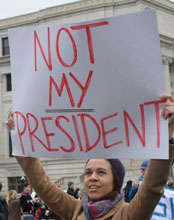 The U.S. president, in executing his office and as Commander-in-Chief, has responsibility to preserve the Union. The Constitution requires him to regularly present the State of the Union to Congress, which has now become a significant yearly speech. On January 30, Donald Trump delivered his State of the Union address in circumstances where the conflicts within and between the presidency, the intelligence agencies and the military are manifesting themselves openly as the fight over the political power becomes sharper and sharper.
The U.S. president, in executing his office and as Commander-in-Chief, has responsibility to preserve the Union. The Constitution requires him to regularly present the State of the Union to Congress, which has now become a significant yearly speech. On January 30, Donald Trump delivered his State of the Union address in circumstances where the conflicts within and between the presidency, the intelligence agencies and the military are manifesting themselves openly as the fight over the political power becomes sharper and sharper.
The growing conflicts within the governing factions were in no way sorted out by the presidential election. Thus, the predominant fear today, expressed by all contending forces, is that the on-going state of civil war, which always exists behind the scenes in the United States, will break out in open violence. Trump thus used the State of the Union to demand "the unity we need" to prevent such a development.
He threatened Americans to stand together or face punishment. Reiterating several times the need for unity to "Make America Great Again," he said this is necessary to avert civil war. He gave his definition of an American and threatened that those who do not adhere to this definition will be branded terrorists and enemy combatants and treated accordingly. This includes the Guantánamo torture camp, which he will increasingly use.
From the beginning of his speech, Trump addressed the warring factions within the ruling class. "Tonight, I call upon all of us to set aside our differences, to seek out common ground, and to summon the unity we need to deliver for the people we were elected to serve," he said.
The reference to "the people we were elected to serve" sounds much broader but the State of the Union speech is delivered to the joint houses of Congress, which is filled with millionaires and is, in large part, comprised of people who represent private interests.
Speaking of his administration he said, "Together, we are building a safe, strong, and proud America." Later he said, "Tonight, I want to talk about what kind of future we are going to have, and what kind of Nation we are going to be. All of us, together, as one team, one people, and one American family."
Note the reference to "family," not to a polity, which signifies a people with political rights, including the right to political power.
He goes on to define just what it means to be part of this "American family."
"We all share the same home, the same heart, the same destiny, and the same great American flag. Together, we are rediscovering the American way," Trump says.
He explains this "American way:"
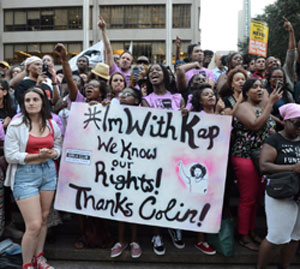 “In America, we know that faith and family, not government and bureaucracy, are the center of the American life. Our motto is "In God We Trust." And we celebrate our police, our military, and our amazing veterans as heroes who deserve our total and unwavering support... Young patriots like Preston [a boy who put flags on the graves of veterans] teach all of us about our civic duty as Americans. Preston's reverence for those who have served our Nation reminds us why we salute our flag, why we put our hands on our hearts for the pledge of allegiance, and why we proudly stand for the national anthem.”
“In America, we know that faith and family, not government and bureaucracy, are the center of the American life. Our motto is "In God We Trust." And we celebrate our police, our military, and our amazing veterans as heroes who deserve our total and unwavering support... Young patriots like Preston [a boy who put flags on the graves of veterans] teach all of us about our civic duty as Americans. Preston's reverence for those who have served our Nation reminds us why we salute our flag, why we put our hands on our hearts for the pledge of allegiance, and why we proudly stand for the national anthem.”
Here Trump is not only calling for unity among the factions, but also targeting all those who may support a different flag, such as the flag of peace, which the U.S. flag certainly does not represent. Recent polls again confirm that the large majority of people in the U.S. are anti-war and stand against U.S. wars of aggression and occupation.
Trump also specifically targeted all those who have stood against police brutality and killings as well as the African American athletes and the many youth and people across the country who have joined them in refusing to stand for the anthem. These forces have all targeted the government and demanded that action be taken to end police impunity and inequality and to defend the right to speak out and resist.
The national anthem represents the Republic, its wars and constitution, which are thoroughly racist and founded on genocide of the Indigenous peoples and the enslavement of Africans. All those who refuse to pledge and stand are not part of the "American family," Trump implied. He backed this emphasis by promoting guests from the military, Immigration and Customs Enforcement (ICE) and police, applauding them as the country's heroes.
Demands for Powers to Fire Federal Workers "At Will"
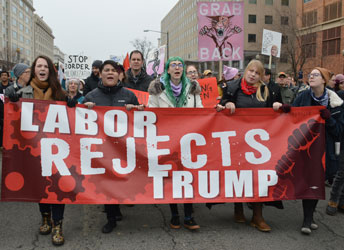 In his State of the Union, Trump also called for the destruction of federal workers' unions through "at-will" contract arrangements. "[...] I call on Congress to empower every Cabinet Secretary with the authority to reward good workers and to remove federal employees who undermine the public trust or fail the American people," Trump said.
In his State of the Union, Trump also called for the destruction of federal workers' unions through "at-will" contract arrangements. "[...] I call on Congress to empower every Cabinet Secretary with the authority to reward good workers and to remove federal employees who undermine the public trust or fail the American people," Trump said.
Trump bragged of having fired 1,500 Veterans Affairs (VA) health care workers for allegedly not providing proper care for veterans. He also alluded to the fact that the "right" of health care workers not to provide medical service on grounds of religious or moral belief has been imposed in the name of defending religious freedom. This is said to permit and protect those who do not believe in abortion to refuse to provide the service.
The paradox lies in saying that workers have the right to affirm their conscience on religious/moral grounds but when it comes to working conditions it is another story. The firing of VA workers was the segue to declaring that to honor veterans means eliminating workers' rights to not be fired arbitrarily and without cause. This aspect of Trump's anti-worker, anti-union actions was generally ignored in the monopoly media's coverage of Trump's State of the Union speech as well as in the official response of the Democratic Party.
The notion of loyalty to veterans and soldiers Trump gave in his State of the Union is used to justify the government’s ability to fire federal workers "at will." This would establish what is called "at will workers." He said that in order to have accountability, workers must be deprived of all rights and that this will ensure veterans and others get what they need.
"At-will" employment is a term used in U.S. labor law for contractual relationships in which an employee can be dismissed by an employer for any reason (that is, without having to establish "just cause" for termination), and without warning.[1] This notion is typically traced to a treatise published by H.G. Wood in 1877, called Master and Servant.[2] As if 140 years of the struggle for rights never took place, it is an argument advanced today within U.S. ruling circles to make the reintroduction of slave-labor official legal policy with penalties for non-compliance.
Trump's Attempt to Use Immigration to Unite Factions and Divide Workers
 Trump used immigration to further set the stage to criminalize not only immigrants but those who support them, including at the level of state and local governments. He made a point of branding undocumented immigrants as criminals and gang members. By way of example he used the tragic killing of two young women from families with African American heritage:
Trump used immigration to further set the stage to criminalize not only immigrants but those who support them, including at the level of state and local governments. He made a point of branding undocumented immigrants as criminals and gang members. By way of example he used the tragic killing of two young women from families with African American heritage:
"The savage gang MS-13 have [sic] been charged with Kayla and Nisa's murders. Many of these gang members took advantage of glaring loopholes in our laws to enter the country as unaccompanied alien minors — and wound up in Kayla and Nisa's high school."
Here we see several aspects of how Trump operates. He is striving to win backing among the ruling factions for immigration laws that greatly increase enforcement and criminalization. He is also striving to divide workers, attempting to pit African American families against Hispanic families, particularly those targeted by current laws, especially Salvadorans who have been a significant portion of the immigrants coming into the country recently, many of them youth. He leaves out that the U.S. is responsible for conditions in El Salvador forcing many to emigrate, and that the MS-13 gang, now in El Salvador, has its origins in Los Angeles. Trump has removed Temporary Protected Status (TPS) for Salvadorans, meaning that many who have lived here for decades are now to be deported.
Workers originally from El Salvador, like many from Mexico, are an integral part of the U.S. working class. Both are a significant part of the resistance among U.S. workers and united efforts to defend the rights of all, such as at May Day demonstrations. Trump is hoping to block the further development of a political movement of the workers with these various attacks.
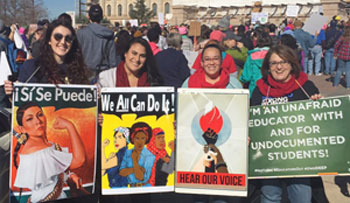 The many demonstrations involving hundreds and thousands of Americans from all walks of life, including the women's marches and actions opposing Trump's immigration bans, border wall and promotion of Nazis and KKKers, show the persistence of the people to build their united resistance for their rights.
The many demonstrations involving hundreds and thousands of Americans from all walks of life, including the women's marches and actions opposing Trump's immigration bans, border wall and promotion of Nazis and KKKers, show the persistence of the people to build their united resistance for their rights.
The Trump administration is also threatening to bring charges against city officials, such as those in California, Illinois and New York, who provide sanctuary cities for undocumented immigrants. These officials do not fully cooperate with ICE in holding or turning over immigrants who have been arrested on minor charges. Trump has already said sanctuary cites are a threat to national security. His State of the Union address raised the specter that if he does not secure the unity he demands, he may consider these government officials enemy combatants. He is already implying that those who defend immigrant rights and stand against police impunity should be considered "un-American" and treated accordingly.
Resurrecting Enemy Combatants and Guantánamo
Trump specifically resurrected the use of the term "unlawful enemy combatant" and reintroduced the policy to use torture camps such as Guantánamo:
“Terrorists who do things like place bombs in civilian hospitals are evil. When possible, we annihilate them. When necessary, we must be able to detain and question them. But we must be clear: Terrorists are not merely criminals. They are unlawful enemy combatants. And when captured overseas, they should be treated like the terrorists they are...I am asking Congress to ensure that, in the fight against ISIS and al Qaeda, we continue to have all necessary power to detain terrorists, wherever we chase them down, wherever we find them. And in many cases, for them, it will now be Guantánamo Bay.”
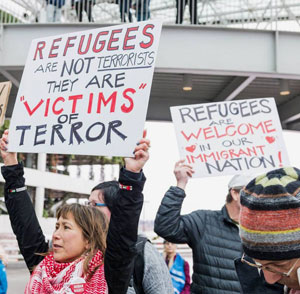 This reiterates that the president alone determines who is and is not a terrorist, to be annihilated, and who is and is not an unlawful enemy combatant. The history of Guantánamo, its torture and illegal and indefinite detention, has shown this. The "wherever we chase them down" includes the U.S., as already occurred under Bush and Obama.
This reiterates that the president alone determines who is and is not a terrorist, to be annihilated, and who is and is not an unlawful enemy combatant. The history of Guantánamo, its torture and illegal and indefinite detention, has shown this. The "wherever we chase them down" includes the U.S., as already occurred under Bush and Obama.
Trump is telling people at home and abroad that he is prepared to criminalize all who do not submit to his definition of being American and supporting America. He stated this directly in relation to those abroad: "Around the world, we face rogue regimes, terrorist groups, and rivals like China and Russia that challenge our interests, our economy, and our values. In confronting these dangers, we know that weakness is the surest path to conflict, and unmatched power is the surest means of our defense."
The "unmatched power" includes modernizing the U.S. nuclear arsenal and increasing the Pentagon budget still further, and further threats against Korea and Iran. Trump repeated the U.S. nuclear policy of "peace through strength," saying: "We must modernize and rebuild our nuclear arsenal, hopefully never having to use it, but making it so strong and so powerful that it will deter any acts of aggression by any other nation or anyone else."
"Perhaps someday in the future, there will be a magical moment when the countries of the world will get together to eliminate their nuclear weapons. Unfortunately, we are not there yet, sadly," he added.
Trump also said that those who vote against the U.S. in the UN will be subject to this "unmatched power," and deprived of U.S. aid. Referencing the UN vote where the large majority voted against U.S. plans to move its embassy to Jerusalem, he said, "I am asking the Congress to pass legislation to help ensure American foreign-assistance dollars always serve American interests, and only go to America's friends. As we strengthen friendships around the world, we are also restoring clarity about our adversaries."
Trump once again presented the use of force as the solution to deal with all those who his administration cannot control, whether at home or abroad.
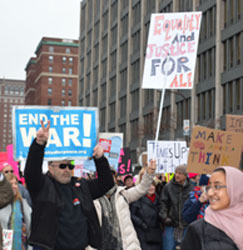 At a time the old arrangements of the Constitution are no longer adequate to resolve conflicts within and between the warring factions, which are striving to control the political power for themselves, the conditions lead to open civil war and U.S.-led imperialist war. At the same time the striving of the American people and the peoples of the world is increasing to find solutions that serve their interests.
At a time the old arrangements of the Constitution are no longer adequate to resolve conflicts within and between the warring factions, which are striving to control the political power for themselves, the conditions lead to open civil war and U.S.-led imperialist war. At the same time the striving of the American people and the peoples of the world is increasing to find solutions that serve their interests.
Trump is attempting to contend with the problem faced by U.S. rulers of open, violent civil war among the factions, coalitions and cartels and its spillover into broader imperialist war where the U.S. cannot predict the outcome. He is calling for unity based on a pledge of allegiance to the U.S. state, its military and police powers, while using "unmatched power" against those at home and abroad who refuse to submit.
How he thinks this will happen or how it would solve any problem facing the United States at this time has become a matter of much diversionary speculation. What the working class and people need is an anti-war government and a new direction for the economy that such a government would require.

Notes
1. "At Will Employment," Wikipedia.
2. A Treatise on the Law of Master and Servant: Covering the Relation, Duties and Liabilities of Employers and Employees. H. G. Wood, Albany, N.Y., J.D. Parsons, Jr., 1877.
[TOP]
Trump Continues to Threaten Use of Nuclear Weapons Against Korea
In his State of the Union address, President Trump generally threatened the peoples of the world, saying simply voting against the U.S. at the United Nations was grounds for being considered an adversary. He also emphasized “In confronting these dangers, we know that weakness is the surest path to conflict, and unmatched power is the surest means of our defense.” He especially targeted the Democratic People’s Republic of Korea (DPRK), as he has been doing his whole first year in office.
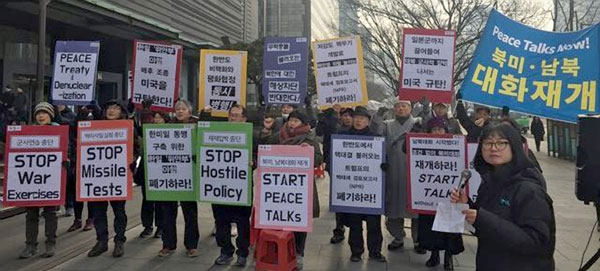
Demonstration in Seoul, south Korea, demands end to U.S. threats and war games and negotiations for a peace treaty and a nuclear-free peninsula, demands also supported by north Korea.
Many presidents have said, in dealing with various countries like Iran and the DPRK, that “all options are on the table.” In addition, Trump has directly and repeatedly threatened to use nuclear weapons in a first-strike against the DPRK. In an effort to justify such action, as well as possible military aggression using conventional weapons, Trump, referring to the DPRK said, “No regime has oppressed its own citizens more totally or brutally than the cruel dictatorship in North Korea. North Korea’s reckless pursuit of nuclear missiles could very soon threaten our homeland. We are waging a campaign of maximum pressure to prevent that from happening.” Then he basically repeats that “weakness is the surest path to conflict,” saying “Past experience has taught us that complacency and concessions only invite aggression and provocation.”
Trump does not say the U.S. is waging a campaign to actually prevent use of nuclear weapons, something desired and fought for by the peoples of the world. Rather he paints the DPRK as the aggressor and promises “unmatched power” against her as the “surest means of defense.”
The aim of making the DPRK the aggressor is to completely hide both her actions and those of the U.S. when it comes to aggression. Consider this information:
1) The DPRK has never engaged in aggression
2) The DPRK has repeatedly said that she will not use nuclear weapons unless attacked. In his New Year’s speech, for example, DPRK leader Marshal Kim Jung Un stated, “As a responsible, peace-loving nuclear power, our country will neither have recourse to nuclear weapons unless hostile forces of aggression violate its sovereignty and interests nor threaten any other country or region by means of nuclear weapons. However, it will resolutely respond to acts of wrecking peace and security on the Korean peninsula. Our Party and the government of our Republic will develop good-neighborly and friendly relations with all the countries that respect our national sovereignty and are friendly to us, and make positive efforts to build a just and peaceful new world.” Not only has she pledged not to use nuclear weapons, her entire history demonstrates that while she defends herself and her right to chart her path forward, she does not engage in aggression.
3) The DPRK has no troops or bases abroad, no warships prowling the seas, no drones bombing other countries.
In terms of U.S. actions:
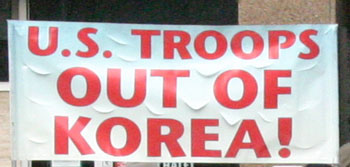 1) The U.S. waged war against Korea, in Korea, not the other way around.
1) The U.S. waged war against Korea, in Korea, not the other way around.
2) The U.S. dropped more bombs on Korea, mainly in the north, than all the bombs dropped in the Pacific theater during WWII. Many massacres of citizens occurred.
3) The U.S. has 28,000 U.S. troops occupying south Korea, plus control of the south Korean Army in times of war.
4) The U.S. repeatedly conducts major war games against the DPRK in the area, practicing bombing raids for using nuclear weapons.
5) The U.S. keeps warships and bombers, some likely loaded with nuclear weapons in the area.
6) The U.S. has a long history and current practice of aggression against Korea and the peoples of the world.
Yet we are to believe the DPRK is the threat.
Trump makes no mention at all of the positive developments in Korea, such as on-going talks between north and south and steps toward reunification. The developments include a single Korean delegation marching together at the Olympics, under the reunification flag. Talks by delegations from the south and north included efforts to work together under the banner By Our Nation Itself. This shows the desire of all Koreans to peacefully reunify their country using their own efforts. These are very significant developments that contribute to peace, yet Trump is silent about them. It is an indication that the U.S. is against reunification, as it would serve as the basis for peace and the basis for ending U.S. interference.
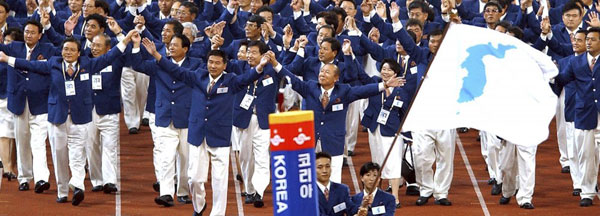
Joint delegation of Koreans north and south under Unification flag at 2000 Olympics. A unified delegation will also march at the 2018 Olympics and talks toward reunification are on-going.
Instead, Trump says, “We need only look at the depraved character of the North Korean regime to understand the nature of the nuclear threat it could pose to America and our allies.” Here we are supposed to accept the possibility of U.S.-launched nuclear war against Korea, not on the basis of responding to an actual attack, but because Trump, yes Trump, claims the regime is “depraved.”
Aggression is not determined on the basis of the personality or depravity of any given head of state. It is based on actual actions, actual bombings, like U.S. drone warfare, U.S. occupation of Iraq and Afghanistan and now a permanent presence in Syria. Crimes against the peace include preparations for war, like the war games, and propaganda for war, as Trump has repeatedly done against the DPRK, calling to rain down “fire and fury” like the world has never seen and “totally destroy” her.
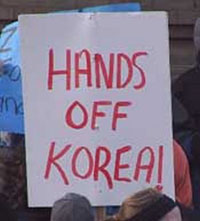 The U.S. acts of aggression, and the whole history of non-aggression by the DPRK, are known — but we are not to look at them. We are not to look at the whole, but only the part proclaimed by Trump of a “depraved” leader.
The U.S. acts of aggression, and the whole history of non-aggression by the DPRK, are known — but we are not to look at them. We are not to look at the whole, but only the part proclaimed by Trump of a “depraved” leader.
Trump is basically trying to use the same sort of disinformation spread about Iraq and Libya and their “depraved” leaders and “weapons of mass destruction.” As with those countries, this is to generate support for U.S. aggression against the DPRK. It is also an effort to undermine the broad anti-war sentiment among the people, stemming in part from lessons learned about U.S. claims about Iraq, Libya, Iran and Viet Nam before that. Let no one be fooled! As the peoples here and worldwide have said in their millions, No! End U.S. Wars! Bring All U.S. Troops Home Now! Hands Off Korea!
U.S. Sanctions Serving to Starve Koreans
To further gain support, as Trump did throughout his speech, he attempts to use an emotionally charged story. In this case he tells the story of a starving boy in the DPRK who loses his legs and then walks thousands of miles on crutches to find asylum outside the DPRK. He was Trump’s guest at the speech and now lives in Seoul where he reportedly rescues defectors.
As with the issue of aggression, the U.S. is silent about its role in trying to starve the people of the DPRK. The U.S. has long imposed sanctions, long before nuclear weapons were an issue. The sanctions are designed to starve the people as the U.S. thinks this will bring about regime change.
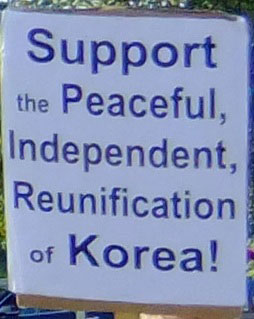 These sanctions against the DPRK were increased still further in the past year and the U.S. has in place potential use of a naval blockade, so as to “turn out the lights” — that is deprive the entire country of fuel and electricity. Yet the Koreans persist and continue to advance on the path of their own choosing. This is what the U.S. refuses to accept.
These sanctions against the DPRK were increased still further in the past year and the U.S. has in place potential use of a naval blockade, so as to “turn out the lights” — that is deprive the entire country of fuel and electricity. Yet the Koreans persist and continue to advance on the path of their own choosing. This is what the U.S. refuses to accept.
The U.S. has the view that bullying combined with “peace through strength” will force peoples to succumb. But this method has repeatedly failed in the face of a peoples mobilized and fighting for their national and social liberation, as is the case for the Koreans, for the Vietnamese, for the Cubans, to name a few, who all faced direct U.S. threats to use nuclear weapons.
It is also the case that we are expected to sympathize with an individual who has no problem supporting Trump and his plans to go to war against his fellow Koreans. Trump is also making clear that the U.S. will support and try to organize defectors, welcoming them into the “American family.” The story is supposed to show the “depravity,” while rallying support for collective punishment against a whole people because of what has happened to this individual.
Trump made a similar effort using the tragic killing of two teenage girls, which he said was done by members of the MS-13 gang who entered the country as unaccompanied minors. That tragedy is supposed to generate support for collectively punishing all unaccompanied minors entering the country, branding them as criminals and treating them as such, rather than as human beings with rights. The Koreans too are not to be seen as human beings and a people striving to reunite through their own efforts, By Our Nation Itself, but as “depraved” and cruel.
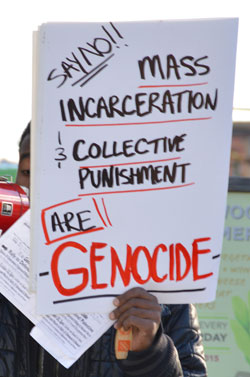 With immigration and Korea, we are not to look at the whole, and certainly not at the social relations between humans and humans that give rise to the current situation of imperialist war and U.S. aggression, which are not in the interests of the people of the U.S. or the peoples worldwide. We are not to look at relations within the U.S. of great and growing inequality and impoverishment and the blocking of the drive of the people for empowerment and all human rights. These relations are indicating that the people must have political power to resolve the dangers brought out in Trump’s State of the Union — including the danger of open and violent civil war as well as broader imperialist war. It makes clear the urgency to organize for an anti-war government. This includes the need for a new electoral process that empowers the people to govern and decide.
With immigration and Korea, we are not to look at the whole, and certainly not at the social relations between humans and humans that give rise to the current situation of imperialist war and U.S. aggression, which are not in the interests of the people of the U.S. or the peoples worldwide. We are not to look at relations within the U.S. of great and growing inequality and impoverishment and the blocking of the drive of the people for empowerment and all human rights. These relations are indicating that the people must have political power to resolve the dangers brought out in Trump’s State of the Union — including the danger of open and violent civil war as well as broader imperialist war. It makes clear the urgency to organize for an anti-war government. This includes the need for a new electoral process that empowers the people to govern and decide.
The existing set-up is rigged against the people and by design keeps the people from power. Electing different people will not eliminate that character. Organizing to develop collectives that take up empowerment, including being decision makers themselves and refusing to turn this over to anyone else, is a step to take. Demanding that candidates submit to the program of the people and their demand for an anti-war government, is another. For the DPRK, let all stand with the Koreans in demanding reunification By Our Nation Itself, without U.S. interference, the removal of all troops, ships and closing of all U.S. bases and signing a peace treaty now!
[TOP]
For Your Information
Sanctions Against the DPRK
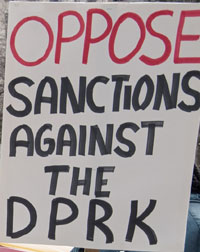 The sanctions adopted against the Democratic People's Republic of Korea (DPRK) by the United Nations at the instigation of the United States are more than sanctions.[1] They are the basis for a blockade of the DPRK, which has called them "an act of war."[2]
The sanctions adopted against the Democratic People's Republic of Korea (DPRK) by the United Nations at the instigation of the United States are more than sanctions.[1] They are the basis for a blockade of the DPRK, which has called them "an act of war."[2]
Economic sanctions are commercial and financial penalties applied by one or more countries against a targeted country, group, or individual. Economic sanctions may include various forms of trade barriers, tariffs, and restrictions on financial transactions. An embargo is similar, but usually implies more severe sanctions.
Economic sanctions are not necessarily imposed because of economic circumstances; they can be imposed for a variety of political, military and social reasons. They can be used for achieving domestic and international purposes.
What typifies a "blockade" is that it pursues the isolation, asphyxiation and immobility of the targeted country, for the perverse purpose of suffocating its people and making it cease to affirm its right to be sovereign and independent. The cardinal elements of the concept of "blockade" are to cut off, close, disconnect from the outside to achieve the surrender of the besieged entity by force or through hunger.
Since the 1909 London Naval Conference, it is an accepted principle in international law that a blockade is an act of war. As such, its use is only permissible between belligerents. There is no rule of international law to justify a so-called peaceful blockade, which refers to a practice of the colonial powers of the 19th century and early 20th century. In 1916 the United States government itself warned France: "The United States does not recognize that right of any foreign power to obstruct the exercise of commercial rights of non-interested countries, resorting to blockade when there is no state of war."
And here we get to the crux of the matter. The belligerent countries which fought in Korea in the 1950-53 war under the UN flag did so to achieve the surrender of the DPRK. They were forced to sign an armistice agreement instead when they were not able to take over all of Korea. After signing the Armistice Agreement, the U.S. has not respected its terms, including its ultimate aim of concluding a peace treaty with the DPRK.
The U.S. first initiated economic sanctions against the DPRK in 1950 under the Trading with the Enemy Act. In a 1997 review of U.S. extra-territorial sanctions in the University of Pennsylvania Journal of Economic Law, Harry L. Clark wrote that "re-export sanctions against North Korea generally mirrored those of Cuba." (Re-export provisions forbid non-U.S. persons from exporting items of U.S. origin or that contain U.S. content from third countries to sanctioned destinations.) At the time, the U.S. had just tightened its blockade of Cuba with new extraterritorial provisions under the 1996 Helms-Burton Act.
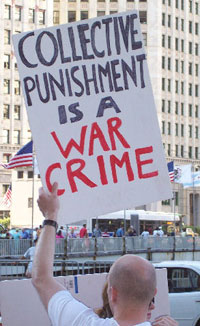 The Indictment for Offenses Committed by the U.S. Government Against the People of Korea 1945-2001 prepared for the Korea International War Crimes Tribunal held in New York City on June 23, 2001 stated in reference to the period from July 1953 to 2001: "The U.S. government forced the imposition of severe economic sanctions on Korea, enforced by blockade and the coercion of other nations and states that were calculated to and did in fact impoverish and debilitate the people of northern Korea damaging the people, the economy, depriving them of essential medicines, medical supplies, safe drinking water, food and other necessities, destroying their lives in major part, committing a genocidal crime against humanity.
The Indictment for Offenses Committed by the U.S. Government Against the People of Korea 1945-2001 prepared for the Korea International War Crimes Tribunal held in New York City on June 23, 2001 stated in reference to the period from July 1953 to 2001: "The U.S. government forced the imposition of severe economic sanctions on Korea, enforced by blockade and the coercion of other nations and states that were calculated to and did in fact impoverish and debilitate the people of northern Korea damaging the people, the economy, depriving them of essential medicines, medical supplies, safe drinking water, food and other necessities, destroying their lives in major part, committing a genocidal crime against humanity.
"The United States government, by imposing sanctions, a blockade, economic coercion on other nations and parties, undermined the health and endurance of the people of northern Korea, used the deprivation of food as a weapon, forcing hunger, malnutrition and starvation that took hundreds of thousands of lives."[3]
The Indictment provided the following details:
".... Economic interference by the U.S. and a devastating blockade were calculated to create conditions to destroy a major part of the northern Korean population, radically reduce available food, medicines, health care and medical capacities causing widespread malnutrition, weakening of the population, increasing susceptibility to diseases, illnesses and epidemics. Chronic food shortages, hunger and periodic famine contributed to a reduced life expectancy of more than six years in the 1990s. Among children under 5 years of age the death rate increased from 27 per 1,000 live births to 48 per 1,000 or 77 per cent, and among infants from 14 to 22.5 per 1,000 live births or 60 per cent. The percentage of the population with safe drinking water has dropped 30 per cent in recent years. Vaccination coverage for diseases like polio and measles fell 40 per cent between 1990 and 1997. Dysentery, iodine deficiency and vitamin deficiency are among many serious health problems for children. Per capita income in the north dropped from $991 per year in 1991 to $457 in 1999. All these figures were reported by AP on May 15, 2001. Over this period of 48 years, unlawful U.S. policies and actions have caused many hundreds of thousands of deaths in Korea. [...]"
In June 2008 the U.S. removed the DPRK from application of the Trading with the Enemy Act and from its "state sponsor of terrorism" list. However it left other sanctions in place and continued to add more under the International Emergency Powers Act and the National Emergencies Act and other legislation. NBC News reported in 2008 that then President George W. Bush said the changes made would have little impact on the DPRK's financial and diplomatic isolation and that "it will remain one of the most heavily sanctioned nations in the world."
UN Security Council Sanctions
United Nations (UN) Security Council sanctions against the DPRK were first adopted in 2006 after that country's first nuclear test. They targeted individuals and entities engaged in activities deemed to be directly or indirectly involved with aspects of its nuclear program, said to be prohibited. These sanctions were stepped up numerous times over the years, with those adopted on December 22, 2017 at the behest of the U.S. and passed unanimously by the Security Council, being the most severe.
They include a 90 per cent reduction in the amount of oil that the DPRK can import as compared to 2016, and impose ruthless restrictions on the export of food and agricultural products, machinery, electrical equipment, earth and stone, including magnesite and magnesia, wood and vessels, besides affecting companies that do business with and in the DPRK, many of them Chinese. Sanctions imposed earlier in 2017 already banned the DPRK from exporting coal, iron and iron ore as well as textiles. According to Reuters, coal and other minerals were the DPRK's biggest export in 2016 and textiles its second biggest, with 80 per cent of textile exports going to China. New regulations introduced targeted sanctions against 15 DPRK officials and call for the repatriation of the DPRK's citizens working in other countries within the next 24 months. This will cut off a vital source of income for many families. The sanctions passed in November 2016 also include restrictions on the export of art from the DPRK, in particular the export of statues, for which the Koreans are world-renowned.
All of this is justified by the anti-communist assertion that the regime in the DPRK uses the income it manages to bring into the country through trade and remittances to proliferate nuclear weapons, not to feed its people.
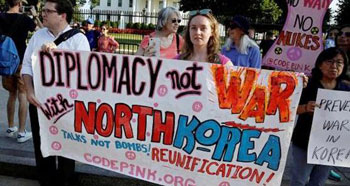 The UN Commission on Human Rights' Sub-Commission on the Promotion and Protection of Human Rights at its 52nd session passed Resolution 1997/35 on August 28, 1997, entitled Adverse Consequences of Economic Sanctions on the Enjoyment of Human Rights. The Sub-Commission expressed its concerns about economic sanctions by framing them in the light of the need to respect the Charter of the United Nations, the Universal Declaration of Human Rights, the International Covenants on Human Rights and the Geneva Conventions of 1949 and the two Additional Protocols thereto. The Sub-Commission stressed four particular points concerning such measures:
The UN Commission on Human Rights' Sub-Commission on the Promotion and Protection of Human Rights at its 52nd session passed Resolution 1997/35 on August 28, 1997, entitled Adverse Consequences of Economic Sanctions on the Enjoyment of Human Rights. The Sub-Commission expressed its concerns about economic sanctions by framing them in the light of the need to respect the Charter of the United Nations, the Universal Declaration of Human Rights, the International Covenants on Human Rights and the Geneva Conventions of 1949 and the two Additional Protocols thereto. The Sub-Commission stressed four particular points concerning such measures:
(i) They should always be limited in time, (fourth preambular paragraph);
(ii) They most seriously affect the innocent population, especially the most vulnerable (fifth preambular paragraph);
(iii) They aggravate imbalances in income distribution (sixth preambular paragraph); and
(iv) They generate illegal and unethical business practices (seventh preambular paragraph).
An impartial reading of the Six-Prong Test to evaluate sanctions contained in The Bossuyt Report produced by the UN Economic and Social Council in response to the Sub-Commission's resolution titled: The Adverse Consequences of Economic Sanctions (see item below), would lead to the conclusion that the sanctions against the DPRK are not only illegal, but indeed an act of war. They are not imposed for legitimate reasons since the danger to world peace is not posed by the DPRK's nuclear tests, which are self-defense measures, but by the U.S. striving to dominate the Korean Peninsula and U.S. threats of war and refusal to permit the DPRK to develop its own way of life in peace. In other words, they are motivated by a self-serving political agenda and this is a violation of international law. They also violate humanitarian law. Depriving the DPRK of 90 per cent of its oil necessarily affects every aspect of life, of food production, industrialization and the health and safety of the population.
Notes
1. To see the content of the existing UN Security Council sanctions targeting the DPRK which were first established in 2006 and expanded since, click here.
2. Statement of DPRK Foreign Ministry Spokesman, Korean Central News Agency, December 24, 2017.
3. "Report and Final Judgment on U.S. Crimes in Korea 1945-2001," Korea International War Crimes Tribunal, June 23, 2001.
(TML Weekly, cpcml.ca)
[TOP]
